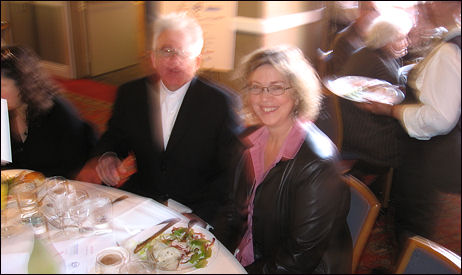
Producer Ron Yerxa, Variety‘s Anne Thompson (rendered with an experimental absence of focus) at today’s BAFTA brunch & viewing party.
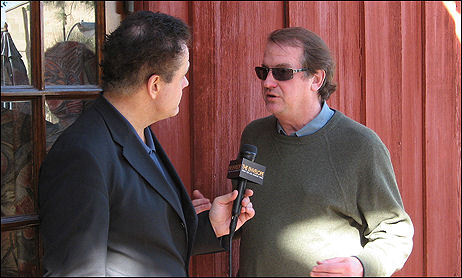
The Envelope‘s Tom O’Neil, Pete Hammond taping an Oscar-related discussion while BAFTA thing was happening indoors.




Roy Scheider, who had a brilliant eleven-year run as a near-movie star during the ’70s and early ’80s, portraying a series of anxious, somewhat bruised urban hard guys in a nearly unbroken run of top-drawer films, died this afternoon in Little Rock, Arkansas, according to the N.Y. Times. He was 75 years old.
Scheider had “suffered from multiple myeloma for several years, and died of complications from a staph infection,” his wife told the Times.
Scheider’s eleven-year hot streak began with his breakout performance as “Cloudy”, Gene Hackman‘s partner in William Freidkin‘s The French Connection (’71). His next two films, The Seven-Ups and Sheila Levine Is Dead and Living in New York, were substandard but Scheider scored big with his Chief Brody role in Steven Spielberg‘s Jaws (’75). He was almost as good the following year as Dustin Hoffman‘s older intelligence-racket brother in John Schlesinger‘s Marathon Man (’76).
For me, Scheider’s peak was his lead role in Freidkin’s Sorcerer (’77) in which he played the role that Yves Montand became famous for in Henri-Georges Clouzot‘s Wages of Fear, the 1955 French film that Sorcerer was a remake of.
His performance in Jonathan Demme‘s Last Embrace (’78) was emotionally raw and close to the bone. He was even stronger as a Bob Fosse-like character — a self-destructive womanizing choreographer — in Fosse’s All That Jazz (’79). I saw Scheider give a gripping, first-rate performance as the cuckolded publisher husband in a Broadway production of Harold Pinter‘s Betrayal, with Blythe Danner and Raul Julia. His last reasonably decent role in this streak was Dr. Sam Rice in Robert Benton‘s Still of the Night (’82) with Meryl Streep.
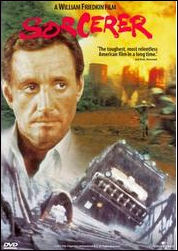
From then on things started to go downhill. Scheider worked and stayed in the groove as best he could, but he seemed to take more and more straight-paycheck jobs. I thought Blue Thunder devalued him because it was basically crap despite the money it made. Playing Dr. Heywood Floyd in 2010 was a terrible thing to have done. Every film he made from ’82 on was either bad, so-so, “meh” or tolerable. The only half-decent film he did in his getting-older-and-grayer period was Bart Freundlich‘s The Myth of Fingerprints (’97).
I interviewed him in late ’81 or ’82 for Us magazine. We met at a coffee shop on either Lexington or Third Avenue somewhere in the mid ’70s. He used to go there after his morning run. He was a good egg, an honest cat and a hard worker. I’m sorry for his family’s loss. Most actors don’t get to flourish with the kind or roles that Scheider was able to land from the early ’70s to the early ’80s. He had a great run, and we’re all richer for that.
For the crime of having taken five hours off this afternoon, riding the bike over hills and around curves under beautiful blue skies and then taking a nap on the couch, I feel obliged to at least acknowledge the developments since 12:45 or so. The WGA strike all but over pending a membership vote on Tuesday. Barack Obama having won again in Maine (his fourth win this weekend), and by a handsome margin. And Michael Clayton‘s Tilda Swinton taking the Best Supporting Actress BAFTA award. Not bad for a sleepy Sunday.
I’m at the BAFTA awards brunch on the UCLA campus, and the show (a direct feed from London) is about to begin. There’s no suspense in this, however, since the winners (not 100% confirmed but quite possibly reliable) have been leaked and are up now on Sasha Stone’s Awards Daily (www.awardsdaily.com). Posted from my iPhone at 1:01 pm. Update: The feed from London isn’t working so everyone’s just sitting around and drinking champagne. Except for me.
25 minutes from now, four Writers Guild of America honchos will hold a press conference at WGAW headquarters to “update the media on important developments” regarding contract negotiations between the WGA and the AMPTP.
A friend has sent along three links to recent NPR ruminations concerning No Country for Old Men. An “All Things Considered” visit by producer Scott Rudin, “Weekend Edition” chat with director-screenwriters Joel and Ethan Coen, and a “Day to Day” discussion with Oscar-nominated costar Javier Bardem.
Barack Obama‘s successes in yesterday’s primaries “don’t just speak to his popularity as a Democratic candidate,” writes Time‘s Ana Marie Cox. “A close look shows a fundamental shift not just in who’s winning but in who is voting for the winner.
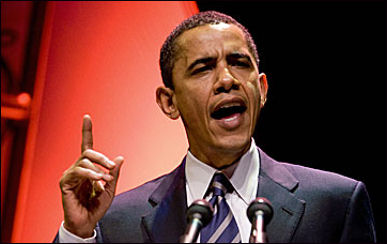
“Obama’s victory in Louisiana could be, if one were especially cynical, written off as success with ‘black voters.’ But what of Nebraska, just to take one example? Obama won the state 68 to 32; he won Nebraska’s second congressional district 77 to 23. And while it’s true that this district (my home district, by the way) encompasses the University of Nebraska and the capital (pointy-headed academics and whatnot), it’s also 80% white, with a mean household income of about $50,000.
“These are not latte liberals. They are just barely caffeinated. What’s more, 1,500 of the 10,000 those who voted in just Lincoln, registered that same day.”
The Envelope‘s Tom O’Neil and Awards Daily‘s Sasha Stone chatting about Oscar blogging and taking shots at pundits like Patrick Goldstein and Scott Foundas, who’ve accused them (and the Oscar-blogging comunity in general) of focusing too much on the race and not enough on the films.
The Clinton campaign’s “other most potent form of currency remains its thick deck of race cards,” N.Y. Times columnist Frank Rich observes in today’s issue.
“In October, USA Today found Hillary Clinton leading Mr. Obama among African-American Democrats by a margin of 62 percent to 34 percent. But once black voters met Mr. Obama and started to gravitate toward him, Bill Clinton and the campaign’s other surrogates stopped caring about what African-Americans thought.
“In an effort to scare off white voters, Mr. Obama was ghettoized as a cocaine user (by the chief Clinton strategist, Mark Penn, among others), ‘the black candidate’ (as Clinton strategists told the Associated Press) and Jesse Jackson redux (by Mr. Clinton himself). The result? Black America has largely deserted the Clintons. In her California primary victory, Mrs. Clinton drew only 19 percent of the black vote.
“Last month a Hispanic pollster employed by the Clinton campaign pitted the two groups against each other by telling The New Yorker that Hispanic voters have ‘not shown a lot of willingness or affinity to support black candidates.’ Mrs. Clinton then seconded the motion by telling Tim Russert in a debate that her pollster was ‘making a historical statement.’
“It wasn’t an accurate statement, historical or otherwise. It was a lie, and a bigoted lie at that, given that it branded Hispanics, a group as heterogeneous as any other, as monolithic racists.”
I have to go to a BAFTA awards viewing party that starts around 11:30 am. Maybe I can file a story or two from this location. I can certainly post a couple of photos.
Isabel Coixet‘s The Dying Animal, which is apparently screening today in Berlin Film Festival, is an erotic drama about a university professor (Ben Kingsley) having a scorching affair with a much younger Cuban student (Penelope Cruz), and the mad possessiveness (stemming from a fear of death) that this alliance brings out in him.
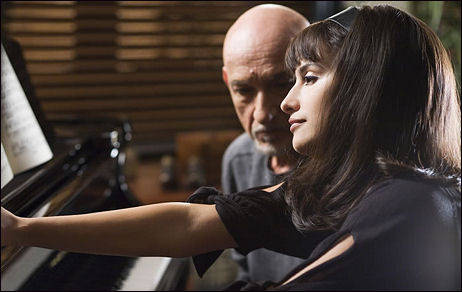
Unreviewed so far (later tonight?), The Dying Animal is based on a Phillip Roth novel of the same name; the title comes from something (a line, a poem… whatever) written by William Butler Yeats, who had a thing for younger women as well.
For the average moviegoer, of course, The Dying Animal is going to be seen as another film about Kingsley doing his wackjob thing — i.e., playing characters who either embody or succumb to an intense but arresting eccentricity bordering on madness. This is what he’s principally become known for since his great seminal performance as Don Logan in Sexy Beast, which came out seven and a half years ago.
Kingsley has played many different sorts, but his nutters attract the most attention. The irresponsible, pot-smoking therapist in The Wackness. The alcoholic hitman in You Kill Me. The nutter criminal type in Lucky Number Slevin. The deranged Herman Tarnower in Mrs. Harris. Is it fair to say that the saner and more rational his characters are, the less engaging Kingsley’s performances are?